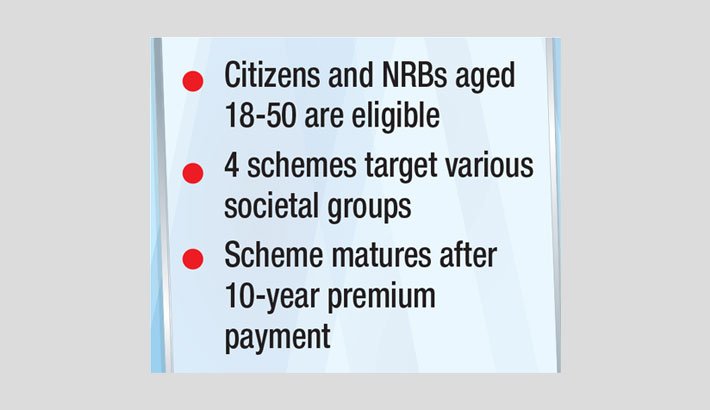The government is set to launch a groundbreaking universal pension scheme today, a significant stride towards ensuring old-age social security for the citizens.
The finance ministry sources have confirmed that Prime Minister Sheikh Hasina will virtually inaugurate the much-awaited scheme.
Four types of pension schemes – Pragati, Surokkha, Samata, and Prabash – will become immediately effective after the inauguration. These cater to various social demographics, encompassing private sector job holders, self-employed communities, expatriate Bangladeshis, and low-income individuals.
Bangladeshi citizens and Non-Resident Bangladeshis (NRBs) aged between 18 and 50 years can enrol in these schemes by paying a fixed monthly premium.
They will then be eligible for a pension after reaching 60 years of age. The provision is also available for people aged over 50 years on special consideration, details of which are yet to be clarified by the finance ministry.
A beneficiary under the scheme will receive a specific amount of pension per month until his death, with the provision of pensions maturing after providing premiums for 10 consecutive years. Additionally, in the event of the pensioner’s death, the nominee will continue to receive the pension until what would have been the pensioner’s 75th birthday.
Out of these, Pragati will be applicable for private sector job holders, Surokkha for self-employed communities, Prabash for expatriate Bangladeshis, and Samata for low-income people.
Only non-resident Bangladeshis are eligible for the Prabash scheme. They have to pay the monthly subscription fee in foreign exchange, but they will receive the pension in Taka after the scheme’s maturity.
Under the Pragati scheme, private job holders have to bear 50 percent of their subscription fee, and the rest will be borne by their employers.
If any private institutions are not willing to enrol under the scheme, their employees will be able to be included under the scheme on their own initiative.
The Surokkha scheme is meant for self-employed people like rickshaw pullers, farmers, labourers, blacksmiths, fishermen, weavers, and others.
The Samata scheme has been targeted at low-income people whose yearly income is less than Tk 60,000. The National Pension Authority under the finance division will be the implementing agency of the universal pension scheme.
Finance division additional secretary Kabirul Ezdani Khan was appointed chairman of the authority last month, while another additional secretary, Md Golam Mostafa, has become a member of the authority.
According to the finance ministry’s circular, a subscriber can nominate more than one nominee or change the nominees’ names if needed.
In cases where the nominee is a minor, another nominated person can withdraw the pension until the minor reaches adulthood.
In the case of the death of any nominee or if their name is not replaced with a new name, the rest of the living nominees will be treated as heirs of the scheme and will receive the pension.
If a subscriber dies prior to the maturity of the scheme, his/her nominees or heirs will receive the deposited money along with the profit.
If a person becomes mentally disabled and can’t pay the premium, the National Pension Authority can transfer the rights to his or her nominees, who will be able to run the scheme and receive the pension after maturity.
In the case of any subscriber’s disappearance, his or her nominees or heirs will be able to continue the scheme after filing a general diary with the police station.
The scheme will be stopped if the subscriber doesn’t return after seven years of disappearance.
In cases of physical or mental disability leading to insolvency to pay the premium, a medical board will declare the individual insolvent, but the account won’t be scrapped even if the premium is unpaid for one year.

